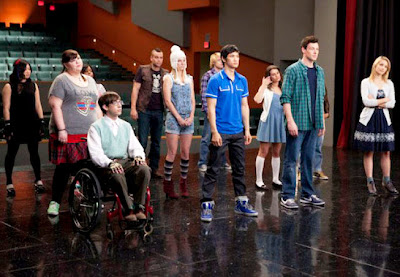The Scream franchise is a series of horror movies whose greatest asset has never been horror. They provide the occasional jump scare, but the strength of the series lies in crafting a critique of the slasher genre, audiences (Scream 2), and Hollywood (Scream 3). The first Scream did the best job in balancing scares with satire, but eventually the series devolved into ninety minutes of misdirection finished by a twenty minute speech where the killer explains his or her motivations. In between the movie gropes at subtext, but rarely in a coherent way that’s clever or rewarding. Scream 4 carries on this sad tradition but adds a heavy dose of resentment to the proceedings as it bitterly attacks everyone who left the snarky franchise behind.
A generation has passed since the Woodsboro murders of the first film and the current generation of damn kids with their music treats the event like it was a joke. Lampposts are decorated with Ghostface masks and there’s even a “Ghostface App” that disguises the user’s voice sound like the serial killer. But then local teens start getting killed just as original survivor girl Sidney Prescott (Neve Campbell) pulls into town to promote her new book about surviving. Meanwhile, Gale Weathers-Riley (Courtney Cox) finds new purpose in trying to track down the killer while husband Dewey (David Arquette) is the town’s new sheriff and continues to prove worthless at law enforcement as he leads deputies Hicks (Marley Shelton), Perkins (Anthony Anderson), and Hoss (Adam Brody) in not catching Ghostface.

We’re also introduced to a cast of fresh young faces who are ripe for the slaughter. There’s Sidney’s cousin Jill (Emma Roberts), Jill’s friends Kirby (Hayden Panettiere) and Olivia (Marielle Jaffe), her ex-boyfriend Trevor (Nico Tortorella), and movie nerds Robbie (Erik Knudsen) and Charlie (Rory Culkin). It’s a bunch of potential suspects, victims, and you barely care about any of them. Scream 4 is so busy trying to cast doubt on everyone, but if any character were too developed, then that might rule them out as the killer and the reveal would be spoiled.
Here’s a tip for storytellers: if your story can be ruined by knowing the ending in advance, it’s not a good story. I won’t spoil Scream 4, but once you know who lives, who dies, and who’s Ghostface, there’s not much reason to return. Good horror doesn’t startle—it scares, and a good mystery is intriguing even once you’ve solved it. But director Wes Craven insists not on crafting quality scares or a well-crafted mystery. Instead, we’re subjected to endless scenes of Ghostface tormenting his prey before he stabs them. It’s the clearest sign yet that the series has fallen prey to the tropes it set out to deconstruct.
And there’s so much in the horror genre that Scream 4 could play with. The series has been gone for ten years and it’s in prime position to return and take on the tropes of horror porn like Saw or handheld horror like Paranormal Activity. Instead, the series simply has characters openly voice criticisms of horror and then resumes not scaring you. The film geeks try to explain that there are new rules, but essentially all they say is that there are no rules, because if there were rules, then you wouldn’t be scared. That was the joke of Scream, but now it’s the premise—no rules so anyone could be the killer and anyone can die.

Rather than place energy into coming up with a clever way to deconstruct horror and increasingly savvy fans, Scream 4 brims with resentment. It seems angry at today’s youth with their youtubes and their facebooks. Occasionally it’s amusing, like when Ghostface tells a dubious teen that he’s “not an app.” But mostly, the movie just takes wild swings at social media, reboots, remakes, sequels, other horror franchises, and even itself. But having characters awkwardly voice criticism of the Scream franchise doesn’t make those criticisms invalid. It just makes them acknowledged. Even worse is Craven who seems uninterested in creating anything new or sharing the playfulness of the script. It’s a bad match for a screenplay that wants to say something (even if it says it poorly) and a director that simply wants to keep creating the same tired jump scares.
If Craven were a little more hip to the story, he would understand that satire and comedy is where the movie could make its mark and when Scream 4 gives itself over to humor, it usually succeeds. While almost all of the characters are underdeveloped, Cox once again scores with her comedic chops and gives Gale the only real character arc in the whole film. The only other performer who shines is Alison Brie as Sidney’s shallow publicist. The character doesn’t represent anything, but Brie brings such a mean peppy energy to the role that she ends up stealing every scene she’s in.
Scream has rarely been scary, but it’s at least had the courtesy to be playful and somewhat thoughtful. Scream 4 has plenty of new material to play with, but the film seems more interested in pursuing tired scares and highlighting its own irrelevancy.
Rating: D+




























